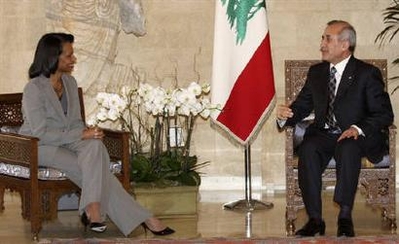 BEIRUT (AFP) – US Secretary of State Condoleezza Rice made an unannounced visit to Lebanon on Monday to bolster the troubled country’s new president, as rival politicians still struggle to form a new government. Rice said she made her lightning trip to "express the United States’ support for Lebanese democracy, for Lebanese sovereignty." After talks with parliament speaker and opposition stalwart Nabih Berri, Rice said that she hoped the disputes over nominations for the key defence, interior, finance and foreign affairs portfolios which have delayed the new cabinet’s formation would be swiftly resolved. "We hope that the composition of the government proceeds and proceeds rapidly," she said.
BEIRUT (AFP) – US Secretary of State Condoleezza Rice made an unannounced visit to Lebanon on Monday to bolster the troubled country’s new president, as rival politicians still struggle to form a new government. Rice said she made her lightning trip to "express the United States’ support for Lebanese democracy, for Lebanese sovereignty." After talks with parliament speaker and opposition stalwart Nabih Berri, Rice said that she hoped the disputes over nominations for the key defence, interior, finance and foreign affairs portfolios which have delayed the new cabinet’s formation would be swiftly resolved. "We hope that the composition of the government proceeds and proceeds rapidly," she said.
Earlier she met Sleiman and told him Washington was very supportive of his presidency, describing him as a "very fine man." She also met Prime Minister Fuad Siniora and parliamentary majority leader Saad Hariri. "We talked of … the United States’ commitment to a Lebanon that is truly sovereign and independent where foreign interference and foreign intimidation should never be permitted," she said after that meeting. She rejected accusations of US interference in Lebanese politics saying: "We support the democratically elected government of Lebanon, that is what we support." Rice, who was in Beirut after a two-day visit to Israel and the occupied West Bank, rejected charges that the Doha deal was a slap in the face for US policy in the region as it had given the Iran- and Syrian-backed opposition veto power over government decisions. "Obviously in any compromise there are compromises," she said. "But this was an agreement that I think serves the interest of the Lebanese people and since it serves the interest of the Lebanese people, it serves the interest of the United States."
The top US diplomat called for UN action on the disputed Shebaa Farms, a district that remains occupied by Israel but "The United States believes that the time has come to deal with the Shebaa Farms issue… in accordance with (UN Security Council Resolution) 1701," Rice said after discussing the issue with the Western-backed premier. She told reporters Washington intends to press Ban to "lend his good offices" to resolve the dispute over sovereignty over the district at the meeting place of the borders between Israel, Lebanon and Syria. "The secretary general should intensify his efforts," she said. Resolution 1701 brought an end to a devastating 33-day war between Israel and Hezbollah in summer 2006 and called for the UN secretary general to propose a border demarcation for the Shebaa Farms.
 Lebanese author Rawi Hage has won the 100,000 euro ($165,000) International Dublin Literary Award, the world’s richest prize for a work of fiction. Canadian-based Hage scooped the award for his book De Niro’s Game, about best friends from childhood who have grown to adulthood in war-torn Beirut. His book describes the agonising choice they must make between staying in the city and consolidating power through crime; or going into exile abroad, alienated from the only existence they have known.
Lebanese author Rawi Hage has won the 100,000 euro ($165,000) International Dublin Literary Award, the world’s richest prize for a work of fiction. Canadian-based Hage scooped the award for his book De Niro’s Game, about best friends from childhood who have grown to adulthood in war-torn Beirut. His book describes the agonising choice they must make between staying in the city and consolidating power through crime; or going into exile abroad, alienated from the only existence they have known.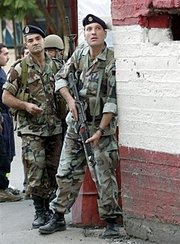 Ain al-Hilweh camp, Lebanon – Tension was obvious at the entrance of the Palestinian refugee of Ain al-Hilweh camp between the Lebanese army and members of fundamentalist groups holed inside the camp after repeated clashes for the past two days. Lebanese army soldiers wearing helmets and bullet-proof vests were on full alert at the entrance of the Palestinian camp in southern Lebanon that houses around 75,000 refugees. The latest clash took place late Wednesday when a fundamentalist gunman was killed and a Lebanese army officer wounded in a shootout near the entrance of the camp which is located at the outskirts of the southern port city of Sidon.
Ain al-Hilweh camp, Lebanon – Tension was obvious at the entrance of the Palestinian refugee of Ain al-Hilweh camp between the Lebanese army and members of fundamentalist groups holed inside the camp after repeated clashes for the past two days. Lebanese army soldiers wearing helmets and bullet-proof vests were on full alert at the entrance of the Palestinian camp in southern Lebanon that houses around 75,000 refugees. The latest clash took place late Wednesday when a fundamentalist gunman was killed and a Lebanese army officer wounded in a shootout near the entrance of the camp which is located at the outskirts of the southern port city of Sidon. 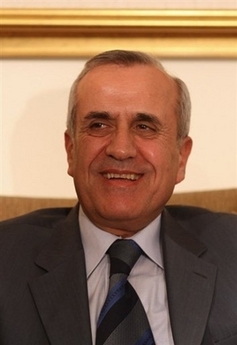 Beirut – Lebanon’s newly-elected President Michel Suleiman has said Lebanon will present new documents to the United Nations proving that the Israeli-occupied Shebaa Farms area is Lebanese, a move that could initiate diplomatic efforts aimed at finding a solution to the issue. According to Lebanese radio reports, Suleiman made the announcement to British Foreign Secretary David Miliband who was visiting Lebanon Monday. Media reports on Tuesday said the president stressed to Miliband Lebanon’s right to regain its sovereignty over the Shebaa farms zone, a tiny enclave, located where the borders of Lebanon, Israel and Syria meet. It has been controlled by Israel since its withdrawal from southern Lebanon in 2000.
Beirut – Lebanon’s newly-elected President Michel Suleiman has said Lebanon will present new documents to the United Nations proving that the Israeli-occupied Shebaa Farms area is Lebanese, a move that could initiate diplomatic efforts aimed at finding a solution to the issue. According to Lebanese radio reports, Suleiman made the announcement to British Foreign Secretary David Miliband who was visiting Lebanon Monday. Media reports on Tuesday said the president stressed to Miliband Lebanon’s right to regain its sovereignty over the Shebaa farms zone, a tiny enclave, located where the borders of Lebanon, Israel and Syria meet. It has been controlled by Israel since its withdrawal from southern Lebanon in 2000. 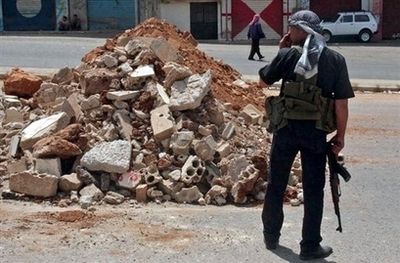 Four people were wounded in armed clashes in eastern Lebanon overnight between supporters of the ruling majority and the Hezbollah opposition, security sources said on Monday. Armed men opened fire with machine guns, mortar rounds and rockets in the village of Saadnayel in the Bekaa Valley in the east of the country during the night and the tension lasted until dawn despite army intervention, the sources said.
Four people were wounded in armed clashes in eastern Lebanon overnight between supporters of the ruling majority and the Hezbollah opposition, security sources said on Monday. Armed men opened fire with machine guns, mortar rounds and rockets in the village of Saadnayel in the Bekaa Valley in the east of the country during the night and the tension lasted until dawn despite army intervention, the sources said. 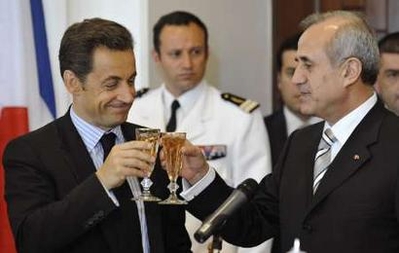 Nicolas Sarkozy, France’s president, is visiting Lebanon as part of efforts to support national unity. The visit comes two weeks after Lebanese leaders sealed a power-sharing deal and elected Michel Sleiman as the country’s president, ending an 18-month political standoff which had erupted into deadly clashes. Sarkozy was greeted at Beirut airport on Saturday by President General Sleiman, Fouad Siniora, Lebanon’s prime minister, and Nabih Berri, the parliament speaker. Sarkozy’s delegation includes Francois Fillon, the prime minister; Bernard Kouchner, the foreign minister; and Herve Morin, the defence minister. Sarkozy, heading a large delegation, arrived in
Nicolas Sarkozy, France’s president, is visiting Lebanon as part of efforts to support national unity. The visit comes two weeks after Lebanese leaders sealed a power-sharing deal and elected Michel Sleiman as the country’s president, ending an 18-month political standoff which had erupted into deadly clashes. Sarkozy was greeted at Beirut airport on Saturday by President General Sleiman, Fouad Siniora, Lebanon’s prime minister, and Nabih Berri, the parliament speaker. Sarkozy’s delegation includes Francois Fillon, the prime minister; Bernard Kouchner, the foreign minister; and Herve Morin, the defence minister. Sarkozy, heading a large delegation, arrived in 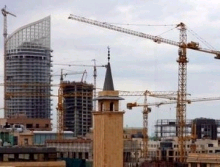 By Ferry Biedermann in Beirut Last month, Beirut
By Ferry Biedermann in Beirut Last month, Beirut


